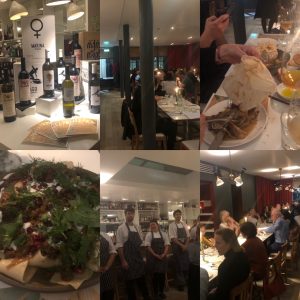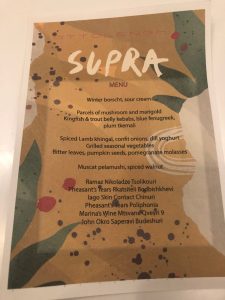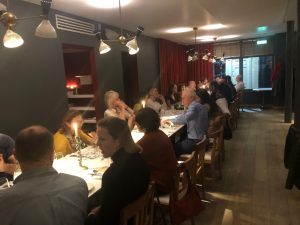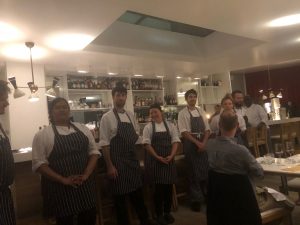
In our culture, we treat wine as a distinctive product, something with a labelled bottle that may engender expectations of a certain quality, something that may be pored over and talked about. In traditional wine countries, however, wine is a kind of nourishing food, always on the table, always part of the meal.
Georgians are renowned for their ancient wine history spanning 8,000 years, 525 (+) indigenous grape varieties, deep amber wines drawn out of qvevri – terracotta vessels buried in the earth – hauntingly beautiful ancient polyphonic songs, poetic and heart-touching toasts, fiery dances, and mosaics of plates full of delicious and colourful vibrancy. The supra is the common sum of all of this together in perfect harmony. It’s a sensory experience for the eyes, ears, scent, palate, and most of all the heart. It is a journey of exchange of knowledge and feelings through the toasts, and emotional rapture from the songs, gastronomic delight from the wine and a cuisine as diverse as the fractions of a rainbow. All presented in a spirit of hospitality that reminds one of medieval chivalry. We sometimes forget that delicious food, and wine, are not ends in themselves but the means for creating an ambient environment for heartfelt discourse – this was the meaning of the original symposium, and is still alive in the present day in the form of the supra.
In traditional wine countries, wine is a kind of nourishing food, always on the table, always part of the meal.
The traditions of supra, as an important part of Georgian social culture, were inscribed on the Intangible Cultural Heritage of Georgia list in 2017. There are 48 such institutions, four of which are on the UNESCO intangible cultural heritage list (including polyphonic singing and qvevri making).
The tamada (literally the head of the tale) is an orator, poet and paterfamilias and through his oratory builds spiritual bridges between the past, present and future. A tamada will propose a succession of toasts on a variety of themes, express heartfelt ideas, and contrive to be witty, erudite and poetical, balancing sentimentality with insight. The guests will then drain their cups (inverting them to shake out the last drops), which will be subsequently replenished. And so it goes, the tamada leading the table with a mixture of solemnity and hilarity, improvising speeches around the ritual toasts.

I was invited to Ottolenghi Spitalfields to talk a little bit about Georgia, the wines that were accompanying a feast and to give an inkling of the responsibilities of the tamada. Throughout our supra we drank some beautiful wines from Ramaz Nikoladze, a vibrant Tsolikouri with no maceration from the limestone soils of Lechkumi, a peachy little Rkatsiteli from Pheasant’s Tears, a structured Chinuri with six months skin contact from Iago, a rich amber Mtsvane from Marina, Poliphonia, a co-ferment of 417 varieties and an inky and spicy Saperavi Budeshuri from John Okro. The wines made so much sense with the food and really came into their own.
The toasts. Wine is a limitless commodity at a Georgian supra, nor is one obviously bound by the constraints of time. Within the structure of the festive supra, one can go off at tangents, slip in little variations on a theme, linger lovingly over a well-honed aphorism, but with a tight wine-dinner schedule, one has to cover all the bases in short order. Georgians expect, and are comfortable with, big-hearted displays of sentiment; the British would find it somewhat quaint, and perhaps even disconcerting, to have to listen to extended homilies about love and harmony – for example – at the dinner table. A toast should only last as long as the time before itchy feet begin to shuffle. This was not a pure or authentic supra, rather one edited for the occasion.
A tamada will propose a succession of toasts on a variety of themes, express heartfelt ideas, and contrive to be witty, erudite and poetical, balancing sentimentality with insight.
Georgians are very proud of their heritage and it seems right to acknowledge how such a small country is able to punch above its weight. When your history looms large and your roots run deep, you certainly feel a deep connection with the past and the people from whom you are descended. And so, to our first toast.
For ancestors – A toast for tradition and traditions, to those people who shaped our present by their very existence in the past, and who gave us our family names which we endeavour every day to live up to. For ancestors!
For family –To mothers, fathers, sisters, brothers, daughters and sons, and grandchildren and other relatives and all those who nurture us and receive our nurture. And to extended family, those people that come into our lives and make us part of their lives. They say it takes a village to raise a child; in this respect, we are all part of one village, one greater family. For family!

Georgians will often toast those who would be with us and unable to at the moment… and for lost loved ones. As much as we may miss them, let’s not be sad, but celebrate these people who are so important to us and send them our loving thoughts. In English, we would say a prayer for absent friends. To absent friends!
For love – There are many types of love. Spiritual love, family love and loving friendship. Love transforms everything. When we are with loved ones, we are the stronger for it, and when we give love – unreservedly and unconditionally – we are the stronger and better for it. To love.
For beauty – Beauty may be found in art, music, dance, poetry and prose. It can be found in every aspect of nature, in the animal kingdom, in a tree or a plant, in the smallest things, and in how we behave, in those basic acts of kindness, thoughtfulness and humility. If we open ourselves to beauty, then we ourselves become beautiful. To Beauty in all our lives!
I wanted to include an example of a toast that was somewhat more playful. Every time I have been to Georgia, I have heard people make brilliant and apt (for want of a better word) speeches that seem to capture the moment or nail a universal truth in an imaginative way. It always leaves you smiling.
To the Cucumber – this one reminds me of the master of the metaphysical conceit, John Donne. Extract of a story told by John Wurdeman, of Pheasant’s Tears to me.
I had promised to immerse Eric into the world of Georgian wine and before each appointment we insisted that they not feed us, as we knew that would cut into our schedule to taste as many wines as possible. When you sit at a table with Georgians you need to be prepared for a long, stoic experience. Despite our injunctions an invariable scenario would ensue: we would be taken to view the vines, taste a range of wines in the cellar, and then be forcibly invited (in the nicest way) to accept the family hospitality and sit at the table for hours amongst a bountiful spread of richly contrasting dishes. One wine only would appear on the table (accompanied by the customary cadence of toasts). After five days, of regularly eating up to five meals a day, we were exhausted, but beautiful nature, warm people and good wine invigorated our spirits. One evening, we arrived several hours late to an esteemed winemaker’s home in the highlands of Racha. We were ready for bed by then, but game had been slain, fish caught, and village singers were waiting for us! The host was also pissed off that we were so late.
So begins the medieval spirited feast with table groaning with delicacies at 11 pm after 5 days of gastro-overload on the road. I am translating in Eric’s ear as toast after toast is rattled off by a burly highland tamada, (toastmaster) who rings a piercing bell (by the way, this not traditional) every time he sees someone dozing off at the table. As I translate the standard toasts for Love, Our Countries, Ancestors, Family, Wine… I begin to drowse off. Eric senses I’m waning, and when the toastmaster comes out with a curious and unusual toast for The Cucumber, he nudges me and says “bullshit, he cannot be talking about cucumbers”. I reply but he is, and the tamada develops his homily thus “…for the artichoke and asparagus want to claim a regal status, while the cucumber humbly is there, never overvalued, never fully appreciated, and, as men, we should all strive to be like cucumbers”. Eric cried out in laughter, amazed and shocked that he was being exposed to such metaphysical (and meta-horticultural) discourse in the by-now wee hours of the morning. Today, it a joke between us that if we see someone behaving in a narcissistic fashion, that we call out their need to strive to reach the cucumber’s humbleness.
I offer you a heartfelt prayer for the cucumber. The cucumber!
There will almost always be a toast for peace – for peace in the world and peace in our hearts. We live in troubled times, and sometimes we feel powerless to do anything. But we can – every choice we make matters, and if hundreds and thousands and millions of people make the right choices and follow through on what they know is right, we have the opportunity to make a change. For ourselves, we also need peace, to be content and to love ourselves. To peace!
Naturally, we must give a toast to wine. Wine is touched by many people on its journey; it starts as a gift from nature, through the growers and farmers who tend the vines with care and love, to the harvesters who bring home the grapes, to those who work in the winery and guide the liquid to the bottle, to those who drink it and appreciate the love that went into every bottle. Wine is the catalyst to enjoyment; it is energy; it is the blood that runs through the meal. To wine!
To food. I would like to propose a toast for the people who brought the food to our tables tonight, from the producers who grew or farmed it, for the care and attention and love with which it was prepared, for the people who shared their knowledge with the recipes, and for the restaurant that gave us the opportunity to sit down, eat and enjoy it. Good food is more than nourishment for the stomach, it is also a sacrament and a civilising influence bringing us together around the dining table in common accord. To food!

The final toast. To you who came here on this night on this special occasion to eat, drink and celebrate Georgian culture. Each of you comes from a different place, from a different background, each with your own different experiences of life. And yet you are all here today in this very moment. This occasion would not be the same without you. I would say a toast to each and every one of you from my heart.
I would also ask you to take home with you some of the love of hospitality that Georgia would show you. If you have ever visited the country, or in the future decide to visit Georgia, know that you will be looked after and that people will show you the true hospitality that Georgia is renowned for. In this final toast I give a double toast to new friends made around this table and to the ancient culture and proud people of Georgia. To Friends and To Georgia!
*
Interested in finding more about the Les Caves’s selection of Georgian wines? Contact us directly:
shop@lescaves.co.uk | sales@lescaves.co.uk | 01483 538820

